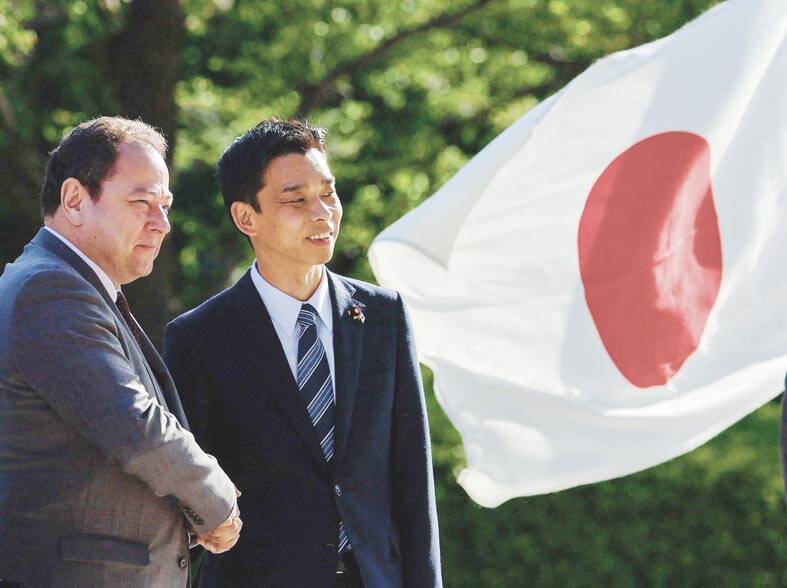Japan would likely come to Taiwan’s aid if China attacks, Japanese State Minister of Defense Toshiro Ino told the Telegraph in an interview published on Sunday.
“If people all over the world have the will to support Taiwan, similar to the way they supported Ukraine when we witnessed Russia’s aggression, then, yes, it would be very possible that we will provide some kind of support to Taiwan,” Ino was quoted as saying
“I am not sure at this juncture whether it is going to be defense equipment support or whether it is going to be logistics support,” he said, adding that it would need the consensus of the Japanese public.

Photo: Reuters
However, Japanese officials are alarmed by the parallels that can be drawn between Russia’s invasion of Ukraine and Beijing’s provocative behavior over Taiwan and in the region’s waters, he said.
Japan has boosted its defense budget by 60 percent over the next five years in response to Beijing’s rapid military build-up under Chinese President Xi Jinping (習近平), Ino said.
“We consider it a threat that China is increasing its military budget and it is sharply increasing its assertiveness in the maritime zones. So far, we have not seen this level of threat before,” he said.
Tokyo has learned from Russian President Vladimir Putin’s disastrous war in Ukraine that it must strengthen its defense capabilities to effectively deter China’s ambitions over Taiwan while focusing on “constructive dialogue” to pre-empt Beijing from escalating, he said.
“We think it is important to demonstrate that it will be difficult to invade Taiwan or make an aggressive move against Taiwan through military means,” Ino said.
If the US is to mount an armed response to a Chinese attempt to take over Taiwan by force, it would almost certainly do so from the various military bases in nearby Japan, he said.
This means Tokyo would have to decide whether to approve Washington’s use of the bases in an active conflict, which might prompt Beijing to attack Japanese territory, Ino said.
Japan would also face the choice of directly joining the fight, in which case Tokyo would seek “maximum support” from allies, including the US and the UK, he said.
“The security environment of the world is becoming the most complicated in its history,” Ino said, referring to the rising belligerence of regional neighbors Russia, China and North Korea.

CHAOS: Iranians took to the streets playing celebratory music after reports of Khamenei’s death on Saturday, while mourners also gathered in Tehran yesterday Iranian Supreme Leader Ayatollah Ali Khamenei was killed in a major attack on Iran launched by Israel and the US, throwing the future of the Islamic republic into doubt and raising the risk of regional instability. Iranian state television and the state-run IRNA news agency announced the 86-year-old’s death early yesterday. US President Donald Trump said it gave Iranians their “greatest chance” to “take back” their country. The announcements came after a joint US and Israeli aerial bombardment that targeted Iranian military and governmental sites. Trump said the “heavy and pinpoint bombing” would continue through the week or as long

TRUST: The KMT said it respected the US’ timing and considerations, and hoped it would continue to honor its commitments to helping Taiwan bolster its defenses and deterrence US President Donald Trump is delaying a multibillion-dollar arms sale to Taiwan to ensure his visit to Beijing is successful, a New York Times report said. The weapons sales package has stalled in the US Department of State, the report said, citing US officials it did not identify. The White House has told agencies not to push forward ahead of Trump’s meeting with Chinese President Xi Jinping (習近平), it said. The two last month held a phone call to discuss trade and geopolitical flashpoints ahead of the summit. Xi raised the Taiwan issue and urged the US to handle arms sales to

A magnitude 5.6 earthquake struck off the coast of Yilan County at 12:37pm today, with clear shaking felt across much of northern Taiwan. There were no immediate reports of damage. The epicenter of the quake was 16.9km east-southeast of Yilan County Hall offshore at a depth of 66.8km, Central Weather Administration (CWA) data showed. The maximum intensity registered at a 4 in Yilan County’s Nanao Township (南澳) on Taiwan’s seven-tier scale. Other parts of Yilan, as well as certain areas of Hualien County, Taipei, New Taipei City, Taoyuan, Hsinchu County, Taichung and Miaoli County, recorded intensities of 3. Residents of Yilan County and Taipei received

Taiwan has secured another breakthrough in fruit exports, with jujubes, dragon fruit and lychees approved for shipment to the EU, the Ministry of Agriculture said yesterday. The Animal and Plant Health Inspection Agency on Thursday received formal notification of the approval from the EU, the ministry said, adding that the decision was expected to expand Taiwanese fruit producers’ access to high-end European markets. Taiwan exported 126 tonnes of lychees last year, valued at US$1.48 million, with Japan accounting for 102 tonnes. Other export destinations included New Zealand, Hong Kong, the US and Australia, ministry data showed. Jujube exports totaled 103 tonnes, valued at